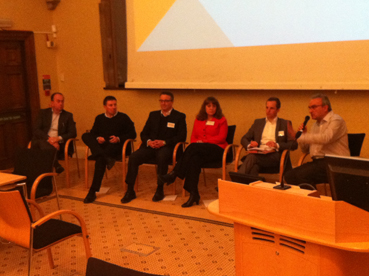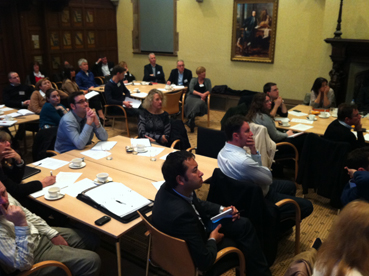|
MORE DETAILS
|
AFTERNOON WORKSHOP - 6 DEC 2011 - ALDERLEY PARK
|
Recent controversies and questions in medical communications
This was an excellent and insightful afternoon's meeting, combining a number of succinct presentations from specialists with a workshop/Q&A session and, as always, the opportunity to network with peers. The objective was to reflect generally on the hot topics that have been debated during 2011 and to look forward to what might be important next year.
Read on for details of the programme, download the presentations and read the report.
PROGRAME:
11.30: Registrations and sandwich lunch
12.30: Welcome and objectives (John Gonzalez, AstraZeneca and Ryan Woodrow, Woodrow Medical)
12.40: Publication planning: unethical manipulation or essential for efficient communication? (Tom Grant, AstraZeneca)
[DOWNLOAD PRESENTATION]
13.05: Lock, stock and barrel: is it possible, practical or popular to publish everything? (Angela Cairns, KnowledgePoint360 Group)
[DOWNLOAD PRESENTATION]
13.30: Is the Sunshine Act the twilight of pharma-sponsored medical writing support? (John Gonzalez, AstraZeneca)
[DOWNLOAD PRESENTATION]
13.55: What are the challenges and opportunities in emerging markets?
(Charlie Buckwell, Complete Medical Group Worldwide)
[DOWNLOAD PRESENTATION]
14.20: Coffee break
14.40: Success, distress and progress in social media (Dave Clarke, Complete Digital)
15.05: Threads, waterfalls and open access: buzzwords or bywords for modern publication planning? (Iain Hrynaszkiewicz, BioMed Central)
[DOWNLOAD PRESENTATION]
15.30: Workshop session at tables
16.00: Panel comments and discussion
16.50: Meeting summary (John Gonzalez, AstraZeneca and Nigel Eastmond, Eastmond Medicomm)
17.00: Close
Taking a weather gauge on the short and long-term future of medical communications
A report from the December 2011 North West MedComms Networking event
By Nigel Eastmond, Eastmond Medicomm Ltd
Alderley Park, December 2011. As the medical communications industry convened for another NetworkPharma event, it did so under the persisting clouds of another turbulent year of change in the industry. At various professional meetings throughout the year, such as those of ISMPP and TIPPA, industry commentators had struggled to forecast the potential impact of negative press coverage, changing guidance, emerging markets, and the financial bombshell of the US physicians' Sunshine Act. Certainly, every meeting convened during 2012 featured new information and vigorous discussion and it has been hard to keep pace with everything that has been going on.
With the winds of change swirling around the business of medical communications, John Gonzalez (AstraZeneca), Tom Grant (AstraZeneca), Ryan Woodrow (Woodrow Medical Ltd) and Nigel Eastmond (Eastmond Medicomm Ltd) worked with Peter Llewellyn of NetworkPharma to deliver a roundup of the year's meetings by selecting some topics from these for discussion at a workshop held at the James Black Centre at AstraZeneca's Alderley Park. These topics included the general criticism of publication planning, the pressure to publish all data, the Sunshine Act, emerging markets, social media and open access publishing.
As the panel and the audience discussed these hot topics, three pervading themes of dichotomy, trepidation and opportunity emerged. Regarding dichotomies, we are all aware of the call from Ben Goldacre and others for pharmaceutical companies to publish everything; and while this is complicated by what the definition of 'everything' is, the resource needed to deliver the required communications is completely at odds with calls for clinical research papers to be planned and written entirely by the investigators. Such investigator-led publications are also unlikely to be published in a timely manner given the other commitments of these busy academics and opposing forces such as this seem to characterise the pressures being place on pharmaceutical companies and medical communications organisations. Of course, full disclosure of data could mean posting them on a web site (such as EUdraCT or clinicaltrials.gov), and the panel discussed the pros and cons of this, and also how that might be done in the context of investigators' desires to achieve peer-reviewed publication. One of the potential solutions to the problem was sitting in the room in the form of Iain Hrynaszkiewicz of BioMed Central who reminded us that while BMC journals are open access and have a lower rejection rate than top flight periodicals, all are peer-reviewed. The debate on 'publishing everything' and the appropriateness of medical writer involvement looks set to run for some time, and it remains to be seen if the opposing pressures will result in genuine problems that make the regulators and the industry critics admit that they can't have it all.
Trepidation pervaded the meeting chiefly from the US physician's Sunshine Act and from the apprehension regarding offshoring of medical writing. The Sunshine Act requires all physician payments and 'transfers of value' to be recorded and declared from January 2012. Transfer of value may include medical writing services, but lawyers are still deliberating on this issue. If it does affect medical writing then the big question is how that value will be calculated. Tom Grant suggested that it could be on the basis of the total cost of the project recorded for each investigator, but the panel acknowledged that there are major difficulties in defining value when salaries and chargeout rates vary between agencies, pharma companies, freelances and offshore writers. At present, investigators - particularly from the US - are beginning to shy away from medical writing support, and if this becomes endemic, it could have a fundamental impact on the medical communications industry. However, it is equally possible that the conflicting pressures described above may ultimately result in acknowledged writing support becoming commonplace and regarded as a necessary feature of physicians operating in the global clinical trials arena. It is even possible that the nature of medical writing contracts for publications could change and sit with the investigator or clinical research organisations rather than the drug company to ensure that there is no transfer of value between pharma and doctors.
Offshore medical writing was uppermost in the minds of those with more than a few years left of their medical writing careers. However, Charlie Buckwell of Complete Medical Group Worldwide was quick to point out that emerging markets were an opportunity for new communications markets and channels, and that Indian and Filipino writers who were trained and able to deliver quality work quickly doubled or tripled their salaries with the overall effect that offshored writing may not save as much money as some may imagine. Instead of saving money, these writers will eventually offer another standard medical writing pool to draw upon. Ultimately, emerging markets in China, Russia, India and elsewhere have the potential to provide the next revenue stream to come online for workers in the global medical communications industry.
The positive aspects of Charlie's talk were an ideal introduction to presentations from David Clark (Complete Digital) and Iain Hrynaszkiewicz, who both described how new concepts in communications delivery though social medial and open access journals have the potential to solve a lot of the problems that the operational side of the industry faces in engaging with physicians and getting material into the public domain. David highlighted how drug companies wishing to engage in social media have finally become frustrated with the lack of guidance from the FDA and the difficulty in applying the largely generic ABPI guidelines. In response, some companies have moved to set their own rules and gain an understanding of the medium though direct experience. Those that have done this have found that the explosion in adverse event reports predicted by social media naysayers has not come to pass. Instead, early adopters such as Johnson & Johnson have been able to leverage their pioneering moves into a strong reputation in the online community. Similarly, those who have embraced the concept of open access publishing are also reaping the rewards of rapid review, wider readership and a greater number of citable publications to support medical communication plans.
Fortune, it seems, favours the bold in emerging markets, new media and publishing. The next five or so years will doubtless tell us if the same can be said for those who make public their backlogs of unpublished data and for those who seek to increase the transparency of their publication planning activities.
At the end of the December meeting, and as a winter storm gathered to lash Scotland and the north of England, the participants at the NetworkPharma meeting left with no doubt battening down the hatches and weathering the maelstrom in the industry will not result in long term success. Instead, there is a need to bend and adapt to the wind in order to survive and thrive in the next era of global medical communications.
Acknowledgements
The organisers wish to thank our guest speakers Angela Cairns (KnowledgePoint360), Charlie Buckwell (Complete Medical Group Worldwide), David Clarke (Complete Digital) and Iain Hrynaszkiewicz (BioMed Central), and AstraZeneca via John Gonzalez and Tom Grant for hosting and funding the event.
Please send ideas for future NetworkPharma events in the North West to Ryan Woodrow (ryan@woodrowmedical.com) or Nigel Eastmond (nigel@eastmondmedicomm.com).
About the author
Nigel Eastmond is a freelance medical writer and editorial consultant, and director of the Eastmond Medicomm writing group. Nigel has 12 years' experience in medical communications and can be contacted on Tel: +44 1663 734690 or Email: nigel@eastmondmedicomm.com Web: http://www.eastmondmedicomm.com Twitter: @eastmondmedicom Facebook: https://www.facebook.com/pages/Eastmond-Medicomm-Ltd/120856611290773


To make sure you're included in announcements about future events just email Peter Llewellyn, if you haven't already done so, to register your interest.
|
|
|

